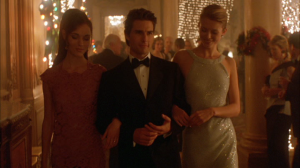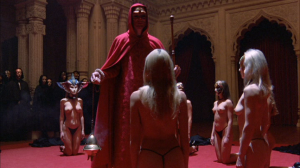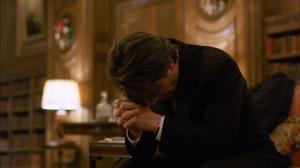Bill Harford is wandering down yet another hallway. This time, he has two ladies on his arm: Gayle and Nuala, on either side. This is where any adult audience would be anticipating the close-ups on Gayle’s neckline, on Nuala’s hips, on Bill’s gleaming, handsome visage. Instead, Kubrick preserves the middle distance that characterizes Eyes Wide Shut‘s signature mix of intimacy (almost curiosity) with firm detachment. We perceive the trio as a unit, arranged as such in a single floating shot, rather than as the traditional amalgam of body parts. It’s a strangely formal titillation, shorn of any real build-up or dramatic tension. The three of them are “staged,” to use Victor’s film-defining formulation, in a manner that spurs wistful contemplation rather than sexy visceral immersion.
Look at Bill, for example. Does he look entertained? Happy? Turned on? No, he just sort of is, drifting down the Corridor of Life (a most tangible metaphor in Kubrick’s movies) wherever it may lead him. EWS is full of sexually aggressive and even predatory men (Victor, Sandor, Milich, Red Cloak) of the sort first in line for protagonist in so many other Kubrick productions. The only real predecessor in the director’s work is Barry Lyndon, in which he cast a notably blank-faced Ryan O’Neal as the titular loser, existing only to reflect, in the emptiness of his social-climbing ambitions, the utter terrifying futility of the status and pretensions of those he meets on the way. Time is the fire, Kubrick reminds with Lyndon‘s chilling epigraph: “It was in the reign of George III that the aforesaid personages lived and quarreled; good or bad, handsome or ugly, rich or poor, they are all equal now.” As that movie’s classic zoom-outs demonstrated, time both moves forward and leaves eras behind it trapped, static, only paintings to be zoomed into and out of.
Time does something else in Eyes Wide Shut. It will spill, as it does at the Christmas Ball, languorously into seemingly infinite pools, only to sudden rush like a river and drag the characters with it. It will hover unblinkingly in the present, as it does for every nervous, excited moment of Bill’s brief introduction to Domino, or silently whirl the past into the moment at hand, as it does during Alice’s intense extended monologue on passion forsaken, or do both at once, as it does throughout the orgy at Somerton, merging pre-Renaissance rituals with Venetian masks with faintly Arabic architecture with modern-day conspiracy theorizing with…it goes on like that, we’ll get there.
But this, all of this, isn’t really to set up some grandiose Strangelove/Clockwork Orange theory about How the World Works. That’s in there, of course (this is Kubrick, even at the end), but whispering malevolently in the background, which is how power and conspiracies and staggering deception feel as Individual Man walking past them, glittering women and golden hallways working to distract you, as you catch the big picture out of the corner of your eye.
So Eyes Wide Shut is about Bill in the same sense that The Shining was about Jack; about these small men and the big things pressing down on their brains. But Jack, of course, fought back a little, employing his (previously restrained) gruesome charm and room-swallowing personality to let his supernatural employers know that while he might be plotting to murder his wife and son, he was going to chop them up on his terms, not the Overlook Hotel’s, damn it. (This is what was known as “irony,” before the ’90s got hold of it.)
Bill doesn’t fight back at all, but he registers the impact of it, at a deep subconscious level that eventually reaches his perfect face. That breakdown, and everything in its wake, is the story of Eyes Wide Shut. (Dramatic, eh?)


